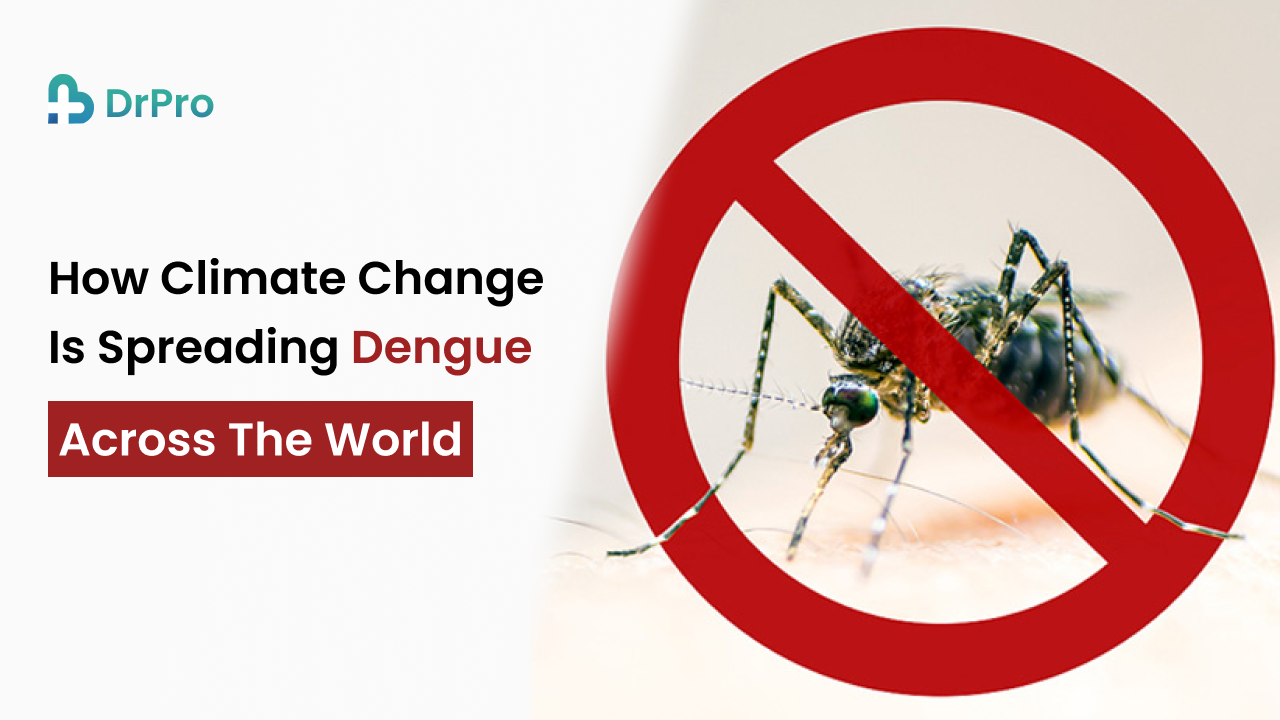Dengue is a rapidly spreading mosquito-borne disease affecting millions of people every year. It is caused by viral infection through infected mosquito bites mainly by Aedes mosquitoes that breed in warm and humid environments. The major thing, in these years, is that climate change has flown this disease into quite newer dimensions making it a newer growing global health issue.
All these result in high temperature increases, erratic rainfall patterns, and extended monsoon seasons that give the ideal conditions for mosquito breeding. Because of this, an increasing number of countries have begun experiencing frequent climate change is spreading dengue.
incidences, many of which had never experienced it. This article will discuss how they explain the link between climate change the spread of dengue, public health impacts, what can be done to mitigate the spread.
What Is Dengue and How Is It Spread?
Dengue, a virus conveyed by the bite of infected Aedes species mosquitoes, Aedes albopictus, is being spread by climate change. In stagnant water, mosquitoes are busy, they lay their eggs.
Symptoms of Dengue
- High fever
- Severe headache
- Muscle and joint pain
- Skin rash
- Nausea and vomiting
How climate change is spreading dengue
1. Rising Temperatures
- Mosquitoes like the Aedes thrive in warm climates.
- The increase in temperature speeds up their breeding cycle.
- The dengue fever virus multiplies quite rapidly inside mosquitoes in the prevalence in warmer conditions.
2. Changes in Rainfall Patterns
- Unpredictable rainfall patterns create more water-logged areas suited for their eggs.
- Heavy rain followed by dry periods invites mosquito larvae to grow.
- Any little areas of stagnant water within cities become breeding grounds for mosquitoes.
3. Longer Monsoon Seasons
- Monsoon makes continuous humidity, which is ideal for mosquitoes.
- Monsoon extensions are kept for longer periods by mosquitoes, incidences of diseases thereof are increased.
4. Dengue Spreading to New Regions
- Aedes mosquitoes are slowly thriving in warmer temperatures in formerly cold locations.
- Countries which reported no incidence of dengue are increasingly facing the effects of the disease, due to mosquito breeding.
5. Urbanization and Waste Management Problems
- Poor garbage disposal leads to stagnant water, which increases the breeding of mosquitoes.
- Overcrowded cities are often deprived of proper sanitation, which increases mosquito breeding.
Dengue as a Global Health Concern
Dengue is now a global health concern with millions of cases worldwide. Presently, climate change is spreading dengu, which hase picked the interest of WHO, which states that it is present in more than 120 countries.
Effects on Public Health
- Increased rates of hospital admission, which burden the health care system.
- Severe cases require emergency attention, causing an increase in health care costs.
- Children and the elderly suffer more from severe complications.
Economic and Social Impact
- Dengue outbreaks lead to a loss of productivity as people take days off from work.
- Governments incur enormous costs on public health interventions against climate change, which is spreading dengue.
- Fear of being struck by this disease hampers daily activities and free movement outdoors.
How to Prevent the Spread of Dengue
1. Strengthening Public Health Interventions
- Government smoke fogging programs should be initiated to obliterate mosquitoes.
- The public should be educated to keep their surroundings clean and dry.
2. Mosquito Control Measures
- Water from containers, drains, and flower pots should be drained.
- Use mosquito nets and mosquito repellents to prevent bites.
- It is recommended to wear long sleeves, in areas where dengue is common.
3. Addressing Climate Change
- Reducing carbon emissions will slow the temperature rise.
- To prevent waterlogging and mosquito breeding, proper urban planning should be practiced.
4. Research and Vaccine Development
- Vaccines against dengue incidence are being develope by some scientists.
- Funds should be allocate to support research for developing other mosquito control strategies.
5. Using Technology for Prevention
- AI tracking systems can help predict and avert dengue outbreaks.
- Drones to detect and eliminate mosquito breeding habitats.
Experts at Wellness DrPro Health state that a combination of public health interventions, mosquito control, and climate action is needed to limit dengue incidence.
more updates for: Chikungunya virus Causes Symptoms Diagnosis and Treatment
Conclusion
Factors such as climate change, temperature rise, erratic rainfall, and prolonged monsoon seasons are fast-tracking the climate change is spreading dengue. The spread of new areas by the Aedes mosquitoes has become an important international health challenge.
To disrupt this transmission chain, the populace, the government must intervene in some way. Simple interventions, such as maintaining the surroundings, using mosquito repellent, and supporting public health interventions, can create an immense difference.
The knowledge of how climate change is spreading dengue should give us an extra push to take action on time to protect our communities from this growing threat.
Frequently Asked Questions
Q1. How does climate change affect dengue spread?
Increased temperatures, rainfall pattern changes create natural environments, within which Aedes mosquitoes breed and distribute their climate change is spreading dengue disease.
Q2. Why is dengue appearing in cooler countries?
Warmer temperatures allow the Aedes mosquitoes to survive in areas that have been cold for them.
Q3. How can I prevent dengue at home?
Your clean surroundings, free from stagnant water, mosquito nets, all forms of repellent, will help you do away with mosquito breeding.
Q4. What are the symptoms of severe climate change is spreading dengue?
Severe dengue can cause internal bleeding, breathing complications, and organ failure and requires immediate medical attention.
Q5. What is the government doing to control dengue?
There are many public health interventions initiate by governments, awareness programs, and funding research on vaccine developments against dengue.

